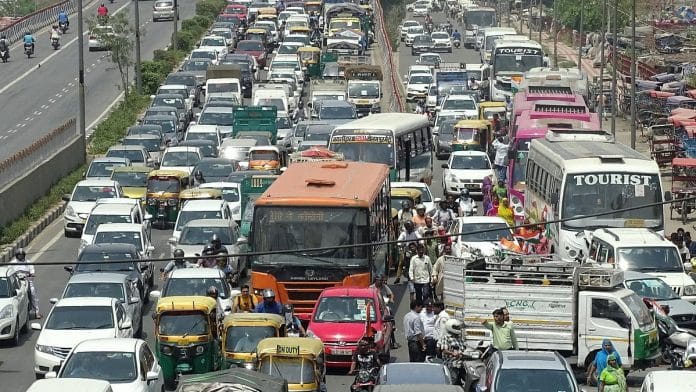New Delhi: While ending the year 2022 on a high note with a strong recovery after the pandemic-induced downturn, the automobile industry is set to drive into the new year with “cautious optimism” as rising covid cases has reignited uncertainty amid concerns over slower economic growth, high inflation and rising interest rates.
The passenger vehicle industry is set to record highest ever sales in 2022, and for the new year analysts have forecast a single digit growth for the segment ranging from flat growth to 7.5% over the high base of 2022. The growth will depend on the impact of factors such as economic growth, high inflation rates and rising retail financing rates.
For two-wheelers, where demand has remained weak over the past few years due to regulatory changes and inflationary pressures, the festive season brought in some respite. Analysts are now forecasting a low double digit year-on-year growth for the sector over a low base. They also feel that stronger adoption of electric two-wheelers will help boost two-wheeler sales.
The other two segments of the industry, commercial vehicles and tractors are also expected to continue to do well.
Also Read: Auto industry can’t grow with 50% tax on cars, says Maruti chairman R C Bhargava
Robust growth in CY 2022
For the calendar year 2022, passenger vehicle industry has already surpassed previous sales high of 33.7 lakh units set in 2018, Shashank Srivastava, senior executive officer, Marketing and Sales, at the country’s largest car-maker Maruti Suzuki India, told The Print.
He added that the industry expects to close this year somewhere around 38 lakh units. This will be a growth of about 23% from last year’s sales of 30.8 lakh units.
“The economy has a very high correlation with the growth of the auto industry… plus there are other factors like liquidity and retail financing rates going up and in this industry 80% retail is through finance,” he noted.
For car buyers though, prices may continue to put a damper on the joy of buying a new car. Even though the commodity prices have stabilised, the prices of cars are expected to go up in 2023 due to the new stricter Real Driving Emissions (RDE) norms that will kick in in April next year, followed by mandatory six airbags in passenger car policy in October.
RDE norms require vehicles to to achieve emission targets in the real world not just labs.
Most of the original equipment manufacturer (OEMs) such as Maruti Suzuki, Tata Motors and Hyundai have already announced plans for the first round of price hikes January onwards, which is generally an annual tradition.
However, Mr Srivastava argued that the industry is not yet fully back on track as semiconductor issues — though better — continue to plague the sector. The industry’s pending order booking for passenger vehicles is estimated to be about 8.25 lakhs.
“The Indian auto industry has witnessed robust growth in CY 2022, compared to the previous two years. This growth has been driven by strong customer demand, new launches, high pending bookings, and a strong festive season,” Shailesh Chandra, MD, Tata Motors Passenger Vehicles and Tata Passenger Electric Mobility, said.
Mr Chandra added that despite semiconductor constraints, each quarter, the industry witnessed supplies of over 9 lakh units and it is estimated that by the end of CY22, the overall sales of passenger vehicles may cross 3.7 million units. “Going forward, we will need to keep monitoring the impact of inflation, high commodity prices (including battery cells) and fuel (including CNG) on the overall demand,” he added.
On the two-wheeler market, Manish Raj Singhania, president at Federation of Automobile Dealers Associations (FADA) said the segment has seen a bit of a recovery since the festive period albeit it has not been as strong as anticipated. However, electric vehicles are expected to push the growth for the segment in the coming year. “Till now we had new generation players operating in this segment and the growth has been good. Now wil traditional players also entering EV space in a big way… we will see higher penetration of two-wheeler EV, which will drive growth for the segment,” he said.
FADA India represents over 15,000 automobile dealers having 26,500 dealerships across the country.
Shamsher Dewan, senior vice president & Group Head, Corporate Ratings, ICRA Limited — a ratings agency — said that factors such as minimal range anxiety and a viable total cost of ownership will continue to spur faster penetration in electric two wheelers and electric three wheelers. The surge in demand has spurred investments by various start-ups in the e2W space, while leading passenger vehicle OEMs have also raised capital in their recently set up EV subsidiaries.
Rohan Kanwar Gupta, vice president & sector head, Corporate Ratings, ICRA Limited noted that two-wheeler demand has remained weak over the past few years with consumer sentiments impacted by factors such as income uncertainty during the pandemic period and a persistent hike in two-wheeler prices led by both regulatory changes and inflationary pressures.
Mr Gupta added that while the festive season brought some respite to the sector, with retail offtake in October 2022 even higher than the pre-pandemic levels, ICRA is cautiously optimistic about demand recovery in FY2024 amid headwinds such as elevated ownership costs and increase in financing rates.
“A low base (even post a 7-9% growth YoY in FY2023) is expected to aid a moderate YoY growth (i.e., 10-12%) for the industry in FY2024,” he said.
Noting that CY2022 was a year of relief for the domestic commercial vehicle (CV) industry, coming out of an extended downcycle, Sruthi Thomas, assistant vice president & sector head, Corporate Ratings, ICRA Limited, said with various growth drivers being intact, growth trends are expected to sustain into the next year as well.
(edited by Anumeha Saxena)
Also Read: Airbag industry to more than double in worth to Rs 6,000-7,000 crore by FY27, says ICRA






